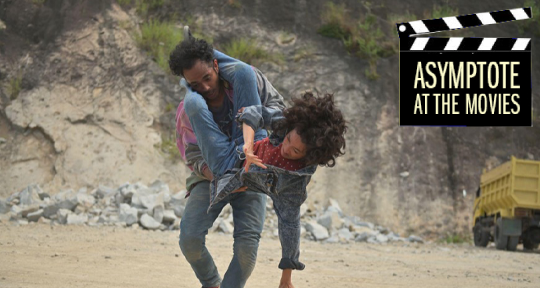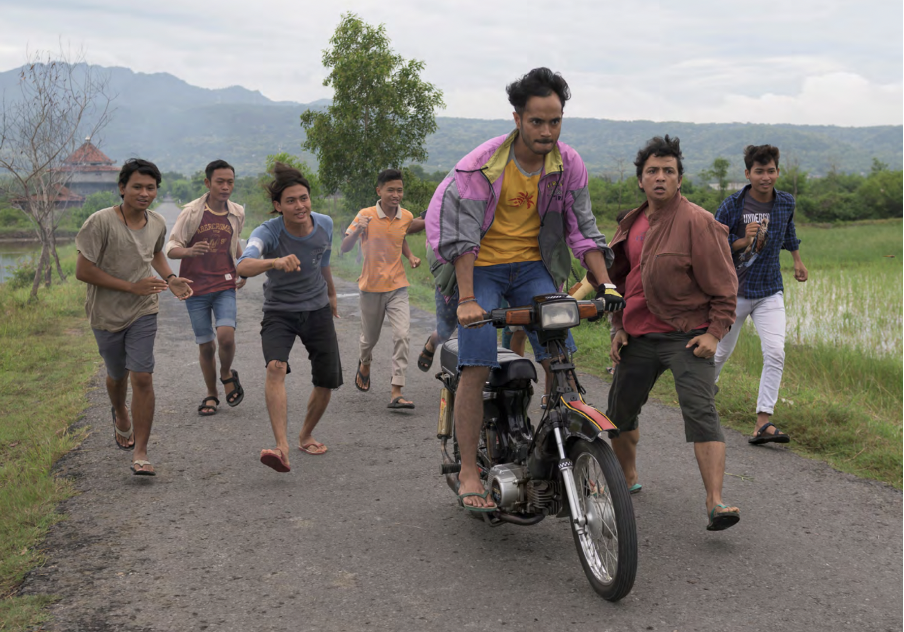Arguably one of the most recognised Indonesian writers in world literature, Eka Kurniawan has earned a global audience—most notably for being the first Indonesian to earn a spot on the Man Booker International longlist with translator Annie Tucker for the sweeping novel, Beauty is A Wound. This August, acclaimed Indonesian director Edwin bagged the Golden Leopard at the Locarno Film Festival for his adaptation of Eka’s Vengeance is Mine, All Others Pay Cash (reviewed here). The story follows the young Ajo Kawir, who tries to compensate for his sexual impotence by turning to fighting, subsequently falling in love with the bodyguard Iteung. In this special edition of Asymptote at the Movies, we are honoured to have Edwin discuss his adaptation of Eka’s work with assistant editor Fairuza Hanun and former-Editor-at-Large for Brazil Lara Norgaard in a wide-ranging conversation that considers the role of language in the multicultural archipelago, critiques of masculinity, and how Eka’s famed fragmentation on the page can hold up as it moves onto screen.
Note: the following piece includes discussion of sexual violence.
Fairuza Hanun (FH): Edwin, I’ve been fascinated by your works, especially Aruna & Lidahnya and Blind Pig Who Wants to Fly, which have explored numerous topical issues, ranging from—but not limited to—gender, race, sexuality, culture, and identity. However, compared to the gritty action-packed Vengeance Is Mine, All Others Pay Cash, your earlier films retained more “domestic” and bittersweet compositions with a main narrative thread. Eka Kurniawan’s literature is well-known for its meandering plots and fusion of socialist and magical realism, and although Vengeance is one of Kurniawan’s more straightforward works, it still possesses his love for multiple threads. This poses my first questions: what are your thoughts on the process of adapting Kurniawan’s braided narrative into a limited screen time? Were there any challenges in transposing his subtlety and explicitness when approaching the taboos of Indonesian society?
I know quite little about the technicalities of cinematography, but I found the film to be absolutely stunning, every scene evoking emotion—the simultaneous isolation and communalism in a village community—and remaining faithful to the descriptions in the book; the actors did a spectacular job at fleshing out the characters. I noticed that the book’s dry, witty humour remains present throughout the film, as well as some of the vocabulary from KheaKamus Besar Bahasa Indonesia (KBBI) being maintained in the dialogue. This intrigued me, as the effects of dialogue in literature and cinema often differ; for instance, how it is made more “acceptable”, or how it can be ignored, if dialect—i.e. contractions, local diction, etc.—is “smoothed out” in writing, reconstructed into a formal, almost mathematically-structured, rendition. Yet, in film, an accurate depiction of the setting can make such a move jarring something out of place in a village with perhaps limited resources to literature, as it seems the people are still steeped in traditional, often superstitious, interpretations. Language should be an intercultural exchange, and Indonesia is a multicultural, multilingual country; mediums of expression which strive to preserve culture should not promote or normalise the process of lingual centrism. I feel that the widespread use of Indonesian and its normalisation or expectations pose an issue of the slow erasure of local languages which have been cultivated throughout generations, to be replaced by the “central” national language.
In regards to that, what are your thoughts on language in the arts, and the process of adapting a book to a film and vice versa? And what is your opinion or definition of a faithful adaptation?




